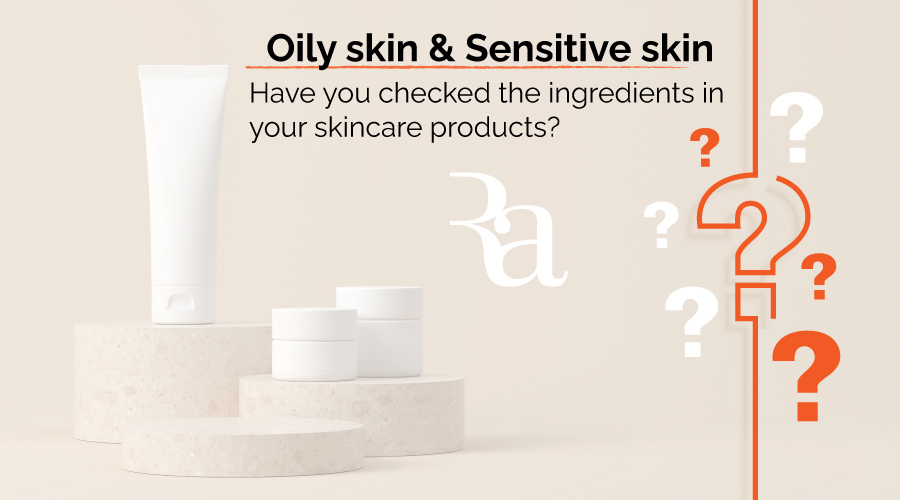Oily Skin & Sensitive Skin: Have you checked the ingredients in your skincare products?
Popular Ingredients demystified: What works and what does not?
Why does skin get sensitive?
Most acne prone people have some irritant in their ointment or other skincare products. They are using these products to reduce acne, but their skin tends to get more sensitive and redder because of this irritant.
Hence it is vital to choose your skin care products wisely.
In recent years, skincare professionals have increasingly noticed that people are a lot more careful about what they put on their face. It is high time people get aware of what each ingredient does to their skin.
Dr. Rashmi Shetty warns us against using any product available in the market that claims to be good. Do your research by reading the labels.
In this informative article, Dr. Rashmi Shetty gives you information on the ingredients to look for in skin care products if you have sensitive and acne-prone skin.
By now, you would have mostly heard of all the terms, at least in broad terms. But, with so many new ingredients coming up now and then, it can get confusing.
What is lactobionic acid?
Lactobionic acid is the oxidized lactose derived from milk. As lactobionic has large molecules, scientifically, it is found not to penetrate the skin and hence a non-irritant.
It is found to be a PHA that helps hydrate the skin and keep it plump.
This ingredient only provides exfoliation on the surface. It is perfect for people with sensitive skin.
It is found to have anti-aging and antioxidant properties. It also suppresses the MMP- matrix metalloproteinases (MMPs) responsible for breaking collagen and elastin.
“Dr. Rashmi Shetty tells us that acne-prone skin needs the right healing ingredient”
What is glucono lactone?
It is a gentle exfoliator. Due to its unique water-attracting hydroxyl groups, the gluconolactone has one of the best hydrating capacity.
1. Exfoliates the skin
Gluconolactone is suitable for sensitive skin, too, as it’s a gentle exfoliant. It also helps you get rid of excess oil.
2. Hydrates the skin
Gluconolactone is known for its water-retaining ability.
3. Acts as an antioxidant
It has the ability to fight against UV rays, pollution, and can also neutralize free radicals.
Glocono lactone is a PHA that does not cause irritation and can be used every day. It is excellent for irritated and angry skin. It is an antioxidant known for its free radical-fighting ability. It is also known to protect skin from harmful UV exposure.
Did you know that Polyhydroxy acids (PHAs) give us the same benefits as AHAs but do not irritate?
PHAs are compatible with sensitive skin. PHAs provide the much-needed moisturization compared with AHAs and can enhance bacterial barrier function. Most PHAs also possess antioxidant properties.
PHAs can be used in combination with other products, ingredients, or procedures to enhance the effects. You can consult your doctor for the right treatment for your skin type.
PHAs are found to be gentler on the skin, causing less irritation. While AHAs are known to deplete the skin of moisture, PHAs can be used on sensitive or dry skin types too.
What are the benefits of Polyhydroxy Acids (PHAs)?
- Promotes cell turnover by removing dead skin cells, gently revealing smoother, healthy new cells underneath.
- PHAs allow for increased hydration, and hence the skin looks smoother and healthier.
- Increased elasticity of the skin
- It is an antioxidant.
- Increased stratum corneum function. It helps keep out irritating chemicals and substances.
- Improves skin clarity and brightness.
- Reduce flare-ups during inflammatory conditions.
What is acetic acid?
Acetic acid reduces dark marks and brings down bacteria on the skin. It causes gentle exfoliation and heals the skin.
Acetic acid is an organic acid generated with the fermentation of ethanol.
- It helps treat dry skin, acne, and flaky skin.
- It is known for antibacterial and antifungal properties, which help eliminate bacteria from your skin, thus keeping acne away.
- It helps prevent skin from becoming excessively oily or dry. It also helps in keeping the skin pores clean.
- It reduces the toxins in your skin.
What is lactic acid?
Lactic acid is one of the larger molecules of the AHA family. It
provides additional moisture to the outer skin layers.
It suits all skin types and is the best exfoliating acid people go to if they have sensitive skin.
What are the skincare benefits of lactic acid?
– A great exfoliator.
“Lactic acid works by gently exfoliating the outer layer of your skin.” says Dr. Rashmi Shetty. It removes the dull and dead cells.
– Reduces acne.
This exfoliation also helps keep pores clear by removing excess oil and dead skin. This, in turn, prevents acne and other related issues.
– Reduces fine lines and wrinkles.
Typically, skin cells in the skin’s outer layer shed regularly and may slow down due to aging, dehydration, and other environmental stressors. It leads to dull skin with wrinkles.
Lactic acid can boost plumpness and reduces wrinkles and lines.
What Is Lipohydroxy Acid (LHA)?
LHA, lipo hydroxy acid, is a derivative of salicylic acid.
Benefits of LHA
– It Gently Exfoliates
According to the National Institute of Health, “The slow penetration of lipo hydroxy acid results in an individual cell-by-cell exfoliation that is associated with excellent tolerability.
– It Can Help Promote Youthful-Looking Skin
Products formulated with LHA can reveal brighter-looking skin.
LHA or Lipo Hydroxy acid or sometimes labeled as capryloyl salicylic acid, is found to be an ideal choice for acne-prone skin.
Fortunately, we have come across one product in the market that has all the above powerful ingredients.
Aziclear face wash by Trikona is found to be one of the best face wash for sensitive and acne-prone skin, having the right ingredients in the right potion.
“Dr. Rashmi Shetty suggests that you always find out which face wash suits your skin. Choose a face wash that is free of harmful chemicals, especially if you have sensitive skin.”
Ra Aesthetics
Subscribe to receive product recommendations, celebrity beauty secrets & expert tips
For more such tips and information from Dr Rashmi Shetty follow her on
https://www.instagram.com/solskincorp/
https://www.instagram.com/drrashmishettyra/
If you have any questions or clarifications after reading this article, please send a DM to Dr Rashmi Shetty.













Leave a Reply
Want to join the discussion?Feel free to contribute!